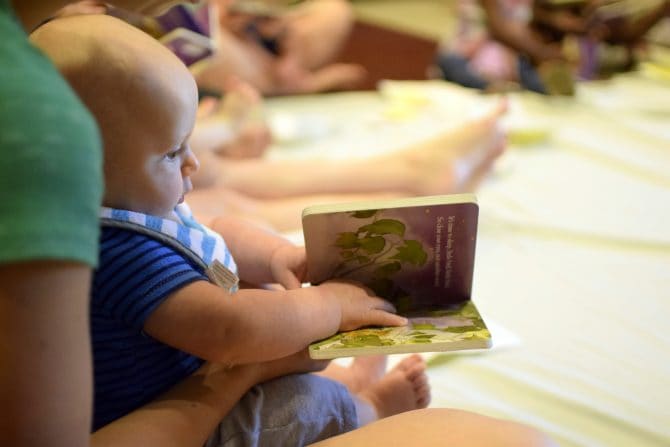 By Susan Erhardt, Branch Outreach and Programming Specialist
By Susan Erhardt, Branch Outreach and Programming Specialist
I had my first baby in 1995, and I was at a loss as to how to fill the ten weeks of maternity leave I had to spend with this tiny, helpless human. I put my daughter in her bouncy seat and read her book after book after book, holding them up in a private storytime. I didn’t realize until many years later the advantage those early reading marathons gave her. Studies have shown that the amount of time adults read to babies and toddlers, as well as the way they read, are big predictors of good early reading and writing skills.
Long before babies talk, they’re learning. By the time a baby is one year old, they already know all the sounds needed to speak their native language. Being exposed to language at an early age has a considerable effect on the way language networks develop in the brain. A study done in 1995 by Betty Hart and Todd Risley found that during the first three years of life, some children hear 30 million more words than others. By third grade, the kids who’d heard more words had bigger vocabularies, better reading skills and higher test scores. Clearly, reading out loud is important!
How can you make sure your child hears more than 30 million words by age three? It seems difficult when you think about the things you say to your child repeatedly. “Time to eat,” “let’s change your diaper” and “get your coat on” aren’t really going to get you there. However, reading aloud is a form of conversation and a lovely way to expose babies and toddlers to words they otherwise wouldn’t hear. Caregivers don’t usually use words like dozing, divvied, tromping and muffled in everyday conversation with their child, but those are all words that appear in children’s picture books. Pointing to pictures, discussing characters and emotions and talking over the story together lead to even more new words.
At Kent District Library, parents are encouraged to participate with their infants in our 1,000 Books Before Kindergarten (1KB4K) reading program. The program is geared to be extremely simple and self-paced to fit within your busy life. Even if you’re unable to get to the library right away, you can sign up online at kdl.org/1kb4k and print the activity sheets. It’s a great way to be aware of just how much you and your child are reading together.
As Dana Suskind says in her book Thirty Million Words, “A word spoken to a young child is not simply a word, but a building block for that child’s brain, nurturing a stable, empathetic, intelligent adult.” It can be hard to schedule reading into an already chaotic day, but I hope you will make time for it. The benefits will last a lifetime!


Add a comment to: Make Time for Reading